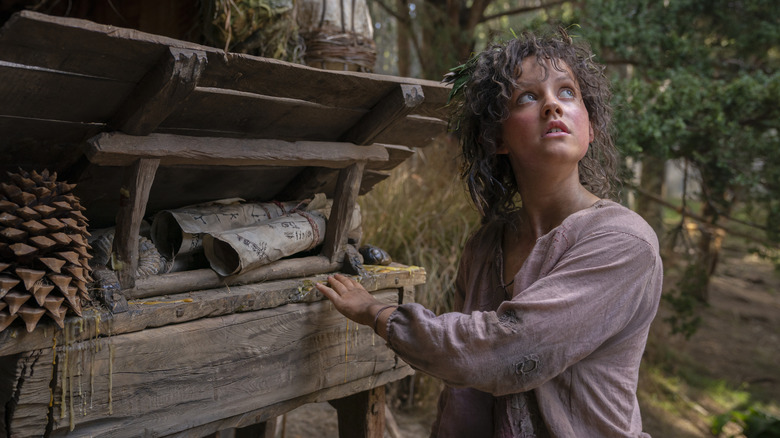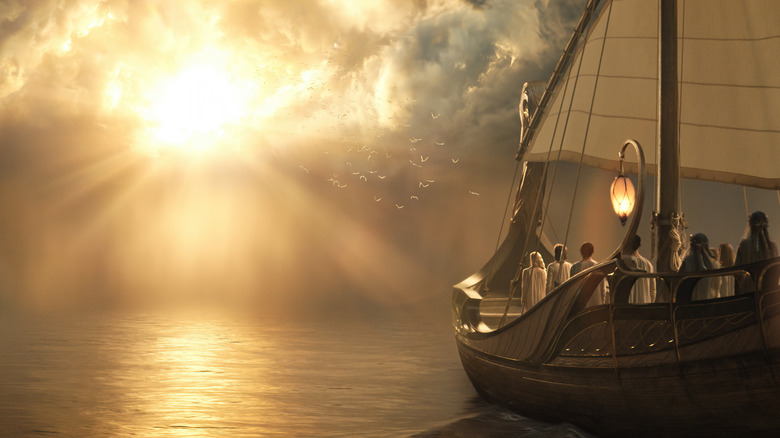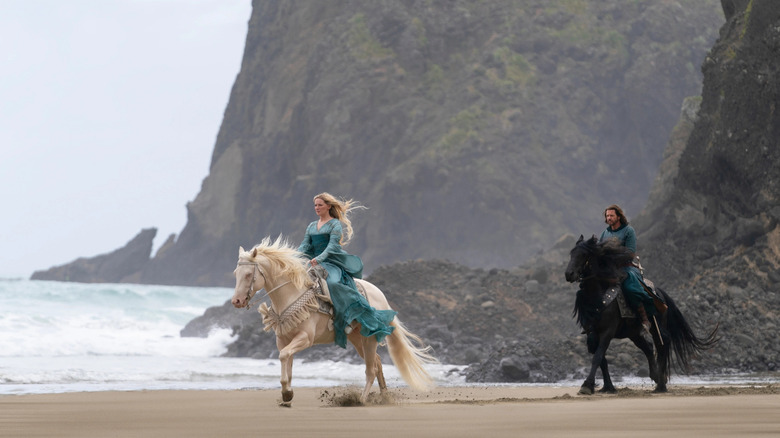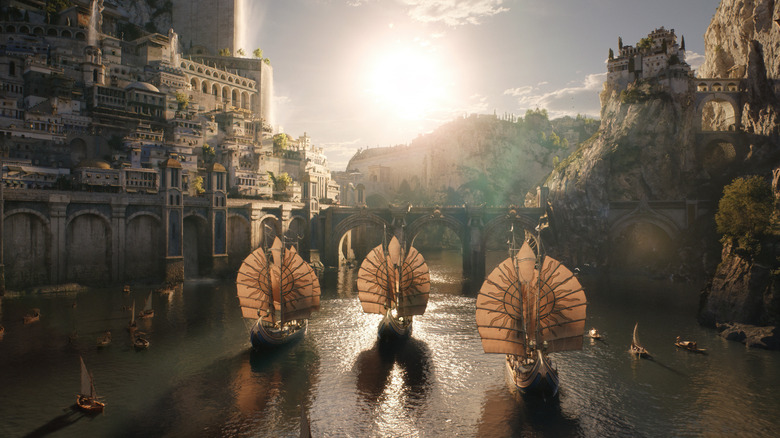The Rings Of Power's Score Is A Testament To The Power Of Music Motifs
For all the noise about how much "The Lord of the Rings: The Rings of Power" has to live up to the standards set by author J.R.R. Tolkien, it's equally true that – fairly or not — the series also has to compete with the original trilogy of films that most hold up as the definitive adaptation. How could anything rival that, let alone a brand-new Middle-earth story with the added pressure of forging its own voice while never straying too far from the expectations of fickle audiences?
Despite the usual antics from a vocal minority of trolls, "The Rings of Power" has drawn plenty of eyeballs and been generally well-received among fans and critics alike in the early going. Much of that has to do with the strength of the characters on display, along with the show's ability to improve on what worked in the previous movies. But it's also kept one secret weapon up its sleeve, ready to be unleashed throughout every episode to this point. Although the series creators couldn't resist borrowing directly from "The Lord of the Rings" and recruiting Howard Shore to craft the stirring opening credits theme, they wisely went out and brought in a not-so-secret weapon of their own.
Composer Bear McCreary's work has stood out again and again in the early going, reminding viewers that "The Rings of Power" doesn't have to live under the shadow of what came before. By establishing fresh themes and memorable motifs that have instantly helped define several different characters, locations, and especially the story's mood and tone, McCreary's score has played a significant role in making this unique version of Middle-earth come alive.
The power of motifs
It may be easy to forget for those who've grown used to the barren wasteland of utterly forgettable scores in most blockbuster filmmaking these days, but once upon a time genre movies and shows relied heavily on composing to help tell their stories through something other than visuals or dialogue. Sure, it's undeniably important to have a killer main theme that passes the ubiquitous "Is it hummable?" test — think of the James Bond movies, "Star Wars," "Indiana Jones," etc. — but it's equally as necessary to include a wide array of themes that viewers can unconsciously connect to multiple aspects of a narrative.
"The Rings of Power" accomplishes this feat as McCreary and his team of unerringly talented musicians established Galadriel's (Morfyyd Clark) ethereal theme, a recurring flute motif and instant earworm for the lovable Harfoots, and even a Nordic-inspired track to signify the Southlands as a distinct region of significance ... all within the span of its hour-long premiere episode!
A breath of fresh air
For those who pay far too close attention to such details, you may have noticed that this stands in stark contrast to countless productions in recent years that seem to treat composition as an afterthought. For a popular example, imagine if the Marvel Cinematic Universe had made as much of an effort to maintain musical continuity as it does with the minutiae of lore continuity. Iron Man, Captain America, Thor, and Black Widow — the pillars of the original Avengers team — have constantly cycled through new composers and new themes with each appearance, robbing audiences of identifying any specific hero with one consistent theme. As a result, there's been little to no musical progression in subsequent movies/shows or clever thematic callbacks during highly-charged emotional moments (like this hint of the Shire theme in "The Return of the King").
It's not the end of the world, obviously, but it's disappointing nonetheless.
Three episodes into "The Rings of Power," the series is still introducing new characters and new locales to the ever-expanding world in-between return trips to old ones. While the scope and scale of the storytelling runs the risk of overwhelming audiences with information overload, another subtle way the score can help is by allowing viewers to maintain a sense of balance.
Location, location, location
In other words, consider Bear McCreary's score as a crucial layer of additional information that can provide exposition, establish the tone, or even act like a signpost for those who may feel a little lost. When characters and locations are inevitably sidelined for a week or two to make room for other storylines — such as the dwarven kingdom of Khazad-dûm, with its theme full of deep bass choir singers and bombastic horns, which was noticeably absent in the last episode — observant fans will already have a built-in sense of familiarity to help reacquaint themselves once we return.
That also applies to never-before-seen places, as well. Most recently, last night's episode threw yet another region into the fray with its own unique culture and characteristics. The precise importance of the island kingdom of Númenor at this early stage will only stand out to diehards, but think back to the direction of that scene when Galadriel and Halbrand (Charlie Vickers) first enter the new realm. Nobody could miss the full weight of that new musical theme, which practically demands that we pay attention.
Although we're still in the very early going, "The Rings of Power" already has 5 total seasons planned. Should the series maintain McCreary all throughout, we can hope that subsequent seasons will build atop the gorgeous musical foundation that this first season is establishing and, perhaps, eventually allow this score to rank among the likes of Howard Shore's for "The Lord of the Rings."



